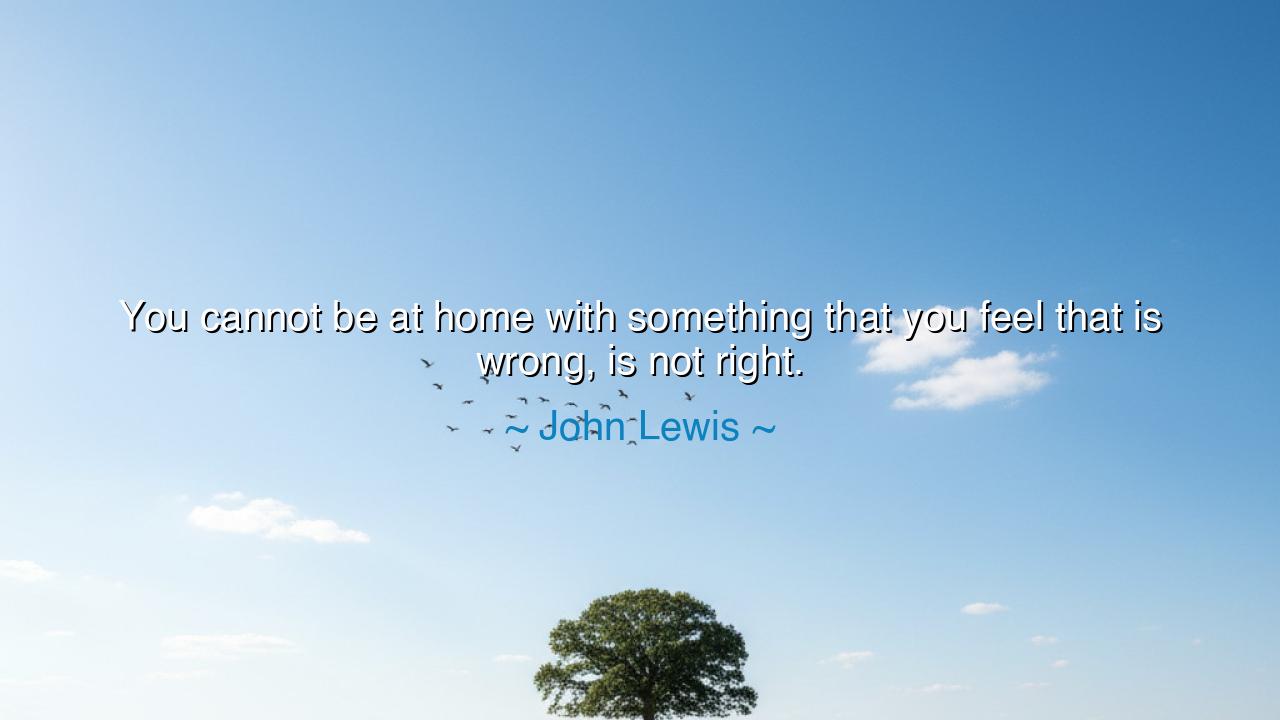
You cannot be at home with something that you feel that is wrong






In the words of John Lewis, the lion of the Civil Rights Movement, we are given a truth forged in the fires of conscience: “You cannot be at home with something that you feel that is wrong, is not right.” These words rise not merely from the tongue of a man, but from the spirit of justice itself. They speak of that divine unrest that dwells in every soul awakened to truth — that holy discomfort which refuses to make peace with injustice, cruelty, or deceit. To be “at home” is to dwell in peace, yet Lewis reminds us that peace without righteousness is illusion — a comfortable lie that corrodes the soul from within.
To feel that something is wrong and remain silent is to live as a guest in one’s own heart. The conscience, that eternal compass placed within us by the Creator, cannot rest where truth is denied. John Lewis, who stood on the bridge at Selma and faced the batons of hatred with the calm of a saint, knew that the greatest torment is not physical suffering, but the torment of the spirit that knows the right and yet fails to act. His words remind us that to live in harmony with the unjust is to live in exile from oneself.
From the beginning of time, those who have followed conscience have been wanderers in a world that preferred comfort to truth. The prophets of old — Jeremiah, Socrates, Gandhi, and Martin Luther King Jr. — all bore the same burden. They walked among their people not as those who felt “at home,” but as strangers who could not make peace with a false peace. Jeremiah cried out against corruption and was thrown into a pit; Socrates questioned his city and drank poison; Gandhi refused to submit to imperial power and faced imprisonment; and John Lewis, in his own day, stood before violence with nothing but faith and conviction. Each of them lived the truth of Lewis’s words — that the heart guided by justice will never be at ease in an unjust world.
The origin of this quote flows from a life steeped in struggle and moral clarity. John Lewis was born the son of sharecroppers in Alabama, raised in the shadow of segregation. As a young man, he joined the Student Nonviolent Coordinating Committee and became one of the original Freedom Riders, facing mobs, arrests, and beatings. On that fateful Sunday in 1965, he led a march across the Edmund Pettus Bridge, where he was struck down and nearly killed by the forces of hate. Yet he rose again, and in the quiet of his later years, he spoke not of vengeance but of moral awakening. His words — “You cannot be at home with something that you feel that is wrong” — come from that life of unbroken integrity. They are not theory, but testimony — born of blood, endurance, and the unyielding voice of conscience.
His message extends beyond the realm of civil rights; it is the universal call to moral courage. For in every age, and in every heart, there comes a moment when one must choose between comfort and conviction. The wrong may not always be visible — it may dwell in our workplaces, our families, or our own habits of indifference. Yet the principle remains the same: if it feels wrong, if it violates the soul’s sense of rightness, it cannot be a home. To dwell within injustice is to live as a ghost — breathing, but not alive.
Consider the story of Dietrich Bonhoeffer, the German theologian who stood against the tyranny of the Nazis. Many of his countrymen chose silence, finding comfort in obedience or fear. But Bonhoeffer could not. “Silence in the face of evil,” he said, “is itself evil.” Like John Lewis, he could not be “at home” in a world poisoned by falsehood. Though he was imprisoned and executed, his conscience remained free — and his courage continues to speak through the centuries. Both men, born in different lands and eras, shared one truth: that a man’s home is not a place, but the alignment of his soul with justice.
The lesson, then, is this: never make peace with what is wrong. Do not build comfort upon compromise or dwell in silence when truth calls. If your spirit stirs with unease, listen to it — for that unease is the voice of life itself. The practical path is clear: speak out, act with integrity, and live so that your soul may rest in harmony with what is right. Let your conscience be your true dwelling, your house built upon the rock of justice.
And so, O seeker of truth, remember the wisdom of John Lewis, the shepherd of good trouble: when the world bids you to accept what is wrong, do not make yourself at home there. Rise, even if alone. Speak, even if trembling. For only those who refuse comfort in the presence of injustice can ever truly know peace. To be “at home” in this life, one must first make a home for truth within the heart — and that, above all, is the dwelling place of the free.






AAdministratorAdministrator
Welcome, honored guests. Please leave a comment, we will respond soon